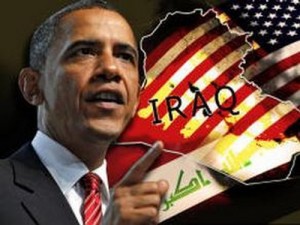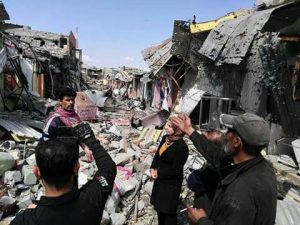State Department Lawyers Removing References to ISIS ‘Genocide’ Against Christians, Other Religious Minorities
Obama holdovers in State Department's legal office are responsible, critics say

The State Department’s top lawyers are systematically removing the word “genocide” to describe the Islamic State’s mass slaughter of Christians, Yazidis, and other ethnic minorities in Iraq and Syria from speeches before they are delivered and other official documents, according to human rights activists and attorneys familiar with the policies.
Additionally, Democratic senators are delaying confirmation of Mark Green, Trump’s pick to head the U.S. Agency for International Development who has broad bipartisan support.
These efforts guarantee that Obama-era policies that worked to exclude Iraq’s Christian and other minority religious populations from key U.S. aid programs remain in place, the activists said.
Richard Visek, who was appointed by President Obama as head the State Department’s Office of Legal Adviser in October 2016, is behind the decision to remove the word “genocide” from official documents, according to Nina Shea, an international human rights lawyer who directs the Hudson Institute’s Center for Religious Freedom.
“I don’t think for a minute it’s a bureaucratic decision—it’s ideological,” said Shea, who also spent 12 years as a commissioner on the U.S. Commission on International Religious Freedom, or CIRF, from 1999 to 2012.
A State Department spokesman on Monday said he would look into the matter and respond.
The latest moves from the State Department’s Office of the Legal Adviser appear aimed at rolling back then-Secretary of State John Kerry‘s March 2016 genocide determination. Kerry’s much-anticipated genocide designation came after months of equivocation and detailed documentation by interested parties that the Islamic State is responsible for genocide against Yazidis, Christians, and Shia Muslims.
It was one of the few times in history that the United States designated ongoing mass murders against ethnic or religious minorities as meeting the legal definition of genocide laid out in a 1948 treaty. That agreement requires signatories, including the United States, to take steps to “prevent and punish” genocide.
A bipartisan group of Capitol Hill lawmakers and activists, including Sen. Marco Rubio (R., Fla.) and Rep. Robert Aderholt (R., Ala.) were hoping the designation would help direct millions of dollars in U.S. relief funds to Christian, Yazidi, and other persecuted religious minority communities.
ISIS murders and kidnappings have decimated the Christian population in Iraq, which numbered between 800,000 and 1.4 million in 2002, reducing it to fewer than 250,000 now. Without action, activists and charities say, Christians could disappear completely from Iraq in the near future.
After meeting with Pope Francis in May, President Trump vowed to do everything in his power to defend and protect the “historic Christian communities of the Middle East.”
Activists and Catholic leaders are now calling on Trump to turn the rhetoric into action on the ground and help get U.S. aid to these persecuted communities trying to rebuild their homes and their lives in Iraq.
These advocates want the State Department, the U.S. Agency for International Development (USAID), and the United Nations to allow church groups and other religious-affiliated relief organizations to receive government aid, a practice prohibited during the Obama administration.
In early May, Congress allocated more than $1.3 billion in funds for refugee assistance and included specific language to try to ensure that at least some of the money is used to assist persecuted religious minorities, including Christians, Yazidis, and Shia Muslims—all groups the State Department deemed victims of genocide in 2016.
Nevertheless, only $10 million is specifically earmarked for Christians, Yazidis, and other religious minorities. The Trump administration has until the end of September, when the stop-gap funding bill runs out, to ensure it distributes the funds in the most effective way.
“There is congressional legislation … that calls for the U.S. government to stop excluding the genocide-targeted minorities in Iraq,” Shea said. “This has been a pervasive problem that this aid has not been getting to them.”
“Iraq is home to one of the four largest remaining Christian communities in the Middle East that are about to become extinct,” she said. “Presidents George W. Bush and Barack Obama made catastrophic mistakes that left these communities on the brink of extinction, but it’s going to be on President Trump’s watch as to whether they survive or become extinct—it’s going to be his policies that make or break the situation.”
Instead of going through Iraqi government agencies or other internationally recognized groups, activists say the best way to get the aid to Christians and other persecuted minorities is through local Iraqi Catholic dioceses and parishes and other religious organizations, such as the Knights of Columbus, which have spent years on the ground working with these communities.
The money would be specifically designated for relief efforts for these persecuted communities and could not be used for other purposes, such as church-building or more general church operations.
Groups say the special allocation is needed because Christians, Yazidis, and other religious minorities often do not go to Muslim-dominated refugee camps out of fear they will be targeted, killed, or kidnapped.
After the Iraqi army retook Mosul from the Islamic State with the help of U.S. forces, much international attention has focused on helping rebuild the Sunni community so that ISIS cannot regain its influence there through sleeper cells or other supportive Islamic terrorist groups.
Shea said Christians will also play a key role in stabilizing the area in and around Mosul if they have enough aid to rebuild their homes in the area and other parts of Northern Iraq.
They could also combat Iran’s colonization of northern Iraq, where pro-Iranian militias are buying up Christian land in the area to try to broaden their influence.
“Christians and Yazidis need to be able to go back to their towns just to hold them—it’s a big national security priority for the U.S.,” she said.
Susan Crabtree is a senior writer for the Washington Free Beacon. She is a veteran Washington reporter who has covered the White House and Congress over the past two decades. She has written for the Washington Examiner, the Washington Times, the Hill newspaper, Roll Call, and Congressional Quarterly.


